
Business Start-up 1 Students Book
.pdf
|
d Vocabulary practice F Page 97, Exercise 1. |
|
2 |
a |
53 Listen to the conversation |
between a customer and a receptionist at the Horizon Hotel. Can the man send and receive emails at the hotel?
b |
53 |
Listen again. What facilities |
|
are there in the hotel business centre? |
|
|
Tick ( |
) the boxes. |
|
1 |
meeting rooms |
|
2 |
photocopier |
|
3 |
fax machine |
|
4 |
drinks machine |
|
5 |
phones |
|
6 |
computer |
|
7 |
power sockets |
c |
54 |
PRONUNCIATION Listen and |
|
repeat. |
|
1 There are meeting rooms.
/ e /
2 There’s a photocopier.
/ e z/
3 Are there power sockets?
/ e /
4 Is there a phone socket?
/ z e /
d Grammar practice F Page 98, Exercise 2.
there is/are
Singular: There’s a photocopier in my office. (there’s = there is)
Plural: There are two printers in the office.
Questions: Is there a fax machine? Are there computers?
Negative: The aren’t phones.
FGrammar reference 10
3a Make verbs from the underlined nouns and fill in the gaps in A’s sentences. Use a dictionary to help you.
1 A |
I need to photocopy this. Could I |
|
use the photocopier? |
B |
Yes, __________ . |
2A I need to __________ my assistant. Can I make a phone call from
here?
B Yes, __________ .
3 A I need to __________ this to my office. Could I use the fax machine?
B Yes, __________ .
4A I need to __________ this file. Can I send emails from this computer?
B Yes, __________ .
5A I need to __________ a copy of this file. Is there a printer I can
use?
B Yes, __________ .
b |
55 |
Now listen and fill in B’s |
replies.
c Practice the conversations in 3a.
need (to)
(need + to + verb)
I need to photocopy this.
(need +noun)
I need a copy of this.
F Grammar reference 16
d Grammar practice F Page 98, Exercise 3.
4Communication practice 13. Student A F Page 80. Student B F Page 89.
USEFUL LANGUAGE
I need to make a phone call. Can I use the phone in the meeting room?
Is there a power socket for my laptop? I need to print this page. Do you have a printer?
I need to photocopy this. Is there a photocopier here?
You can fax it. We have a fax machine.
31
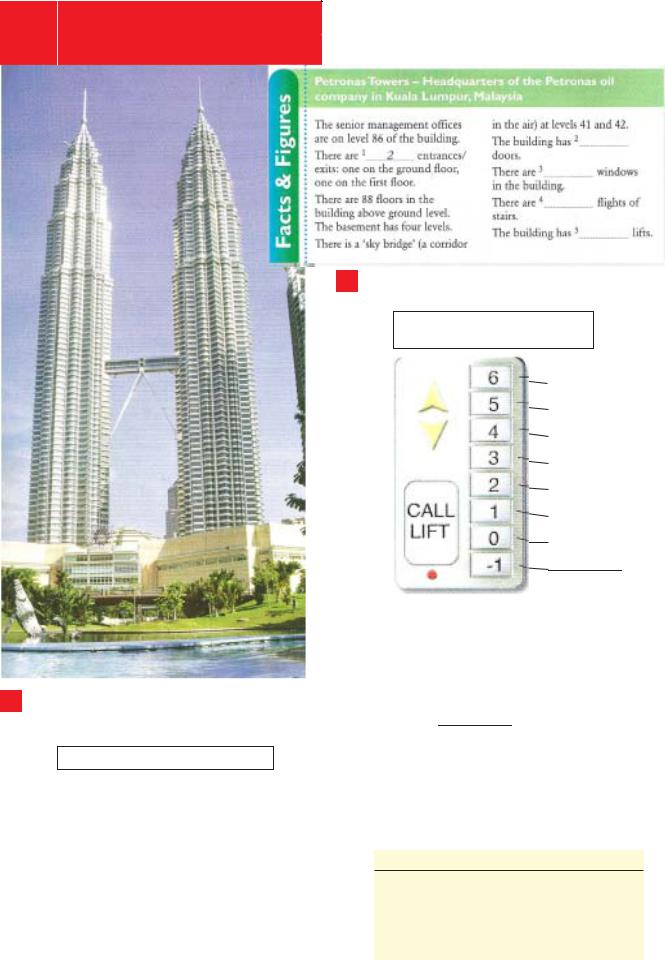
5.2 |
Asking for and |
GRAMMAR |
Imperative |
|
giving directions |
VOCABULARY |
Inside buildings Ordinal numbers |
||
|
1a Work with a partner. Can you complete the Facts and Figures about the Petronas Towers with these numbers?
2 76 765 1,800 32,000
b |
56 |
Listen and check your |
|
answers. |
|
2a Match the words to the buttons on the lift.
basement fifth first fourth ground second sixth third
|
__________ |
|
|
__________ |
|
|
__________ |
|
|
__________ |
|
|
__________ |
|
|
__________ |
|
|
__________ |
|
|
|
basement |
b |
|
Check your answers. Listen |
57 |
||
|
and repeat. |
|
cLook at the Facts and Figures again. Fill in the gaps in these sentences.
The entrances to the Petronas Towers are on the 1 ground and 2 __________
floors.
A ‘sky bridge’ links the two towers on the forty-3__________ and forty-4__________
floors.
Petronas’s senior managers have their offices on the eighty-5__________ floor.
Ordinal numbers
1st = first |
5th = fifth |
9th = ninth |
2nd = second 6th = sixth |
10th = tenth |
|
3rd = third |
7th = seventh |
11th = eleventh |
4th = fourth |
8th = eighth |
12th = twelvth ... |
32

dVocabulary practice F Page 98, Exercise 4.
eTalk about your office.
The office building has ... floors. Our office is on the ... floor.
The entrance is on the ... floor. There’s a / There are ... lifts(s).
3 a Match the words to the signs.
exit lift stairs toilets
|
|
lift |
2 _______ |
3 _______ 4 _______ |
|
|
1 _______ |
||||
b |
|
|
Ask where 1 - 4 are. Listen and |
||
|
58 |
|
|||
|
|
repeat the questions. |
|||
c |
59 |
|
Listen to the people asking for |
||
|
|
directions. What are they looking for? |
|||
|
|
exit |
3 __________ |
||
|
1 __________ |
||||
aOn the right, just after the lift.
bIt’s over there. The first door on the right.
cIt’s just past the stairs. The third door on the right.
dGo through the doors at the end, and they’re on the right.
eGo to the end of the corridor, through the doors, and turn left.
e |
60 Listen and check your |
|
answers. |
f Vocabulary practice F Page 98, Exercise 5.
g |
61 Listen and repeat the |
directions. |
|
1 |
They’re on the right. |
2 |
It’s just past the stairs. |
3 |
Go through the doors. |
2 __________ |
4__________ |
dLook at the office plan. Can you match the questions and answers? Write a - e in the boxes.
4 Go to the end of the corridor.
hWork with a partner. Take it in turns to ask and answer the questions in 3d.
Imperative
Go through the doors. Turn right.
FGrammar reference 11
iGrammar practice F Page 98, Exercise 6.
5Communication practice 14. Student A F Page 81. Student B F Page 89.
1 Excuse me. Where’s the lift? |
b |
2Excuse me. Where are the stairs?
3Where’s the computer room?
4Where’s the drinks machine?
5Where are the toilets, please?
USEFUL LANGUAGE
Excuse me. Where’s ... ?
It’s on the ground/first/second ... floor. It’s over there.
It’s just past the lift, on the the right. Go to the end of the corridor.
Go through the doors. Turn right/left.
33
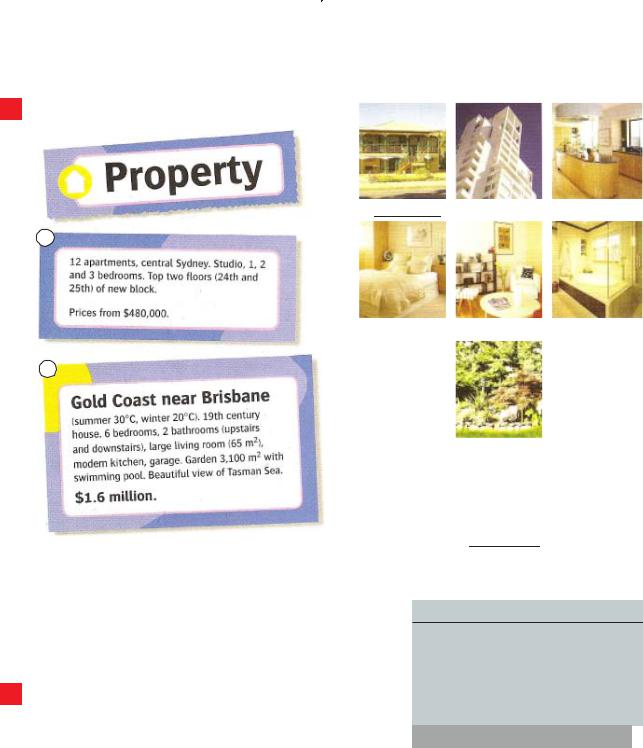
TIME
OUT
5.3 |
Talking about |
GRAMMAR |
Adjectives quite/very |
|
your home |
VOCABULARY |
In and around the home |
||
|
1 a Where are properties in the two adverts?
1 |
house |
2 __________ 3 __________ |
a
b
bFind words in the adverts to match the photos 1 - 8. Use a dictionary to help you.
c |
62 |
Check your answers. Listen and |
repeat.
d Vocabulary practice F Page 98, Exercise 7.
2a Read the adverts again. Underline the correct adjectives in 1 - 8.
1The apartment block is modern/old.
2The apartments are in a low/high building.
3The house is old/new.
4The living room in the house is big/small.
5The kitchen in the house is old/new.
6There’s a nice/horrible view from the garden of the house.
7It’s hot/cold in Brisbane.
8The house is cheap/expensive.
4 __________ 5 __________ 6 __________
7 __________
bFind adjectives in the adverts with a similar meaning.
1 |
new |
modern |
2 |
big |
__________ |
3 |
nice |
__________ |
Adjectives
The apartment is big.
It’s a big apartment.
The rooms in the house are small.
The house has small rooms.
F Grammar reference 12
cVocabulary practice F Page 98, Exercise 8.
34

3a Look at the title of the article. What does ‘hot property’ mean?
bRead the article and answer the questions.
1 How many people live in Australia?
2 Where do most people live?
3 Where is property quite expensive?
4 Where are property prices very low?
quite/very + adjective
It’s very big. |
It’s quite big. |
It’s quite small. |
It’s very small. |
very big |
quite big |
quite small very small |
|
|
|
|
F Grammar reference 12
cNow discuss these questions with a partner.
1What do ‘m’ and ‘km’ stand for?
2What does the writer mean by ‘hot property of a different kind’?
4 a |
63 |
Listen to a man talking to a |
colleague about his home. Underline the correct words.
1The house is quite/very small/big.
2The garden is quite/very small/big.
3The house is quite/very old/modern.
4Property is quite/very cheap/ expensive.
b Grammar practice F Page 99, Exercise 9.
5Communication practice. 15. Student A F Page 81. Student B F Page 90.
6a Work with a partner. Talk about each
other’s homes.
Where ... live? ... house or apartment?
... big?
... garage/garden?
bTalk about property prices in Brazil.
Are property prices high?
In what cities/regions is property expensive/cheap?
In what parts of your town/region is property expensive/cheap?
USEFUL LANGUAGE
I live in a house / an apartment in ...
It’s ... kilometres from ... .
The house/apartment is quite/very big/ large/small. It’s ... square metres.
It’s old/modern. It’s quite/very nice.
It has ... bedrooms. It has a big/small garden.
Is property expensive in your country?
In ... prices are quite/very high, but in ..
35
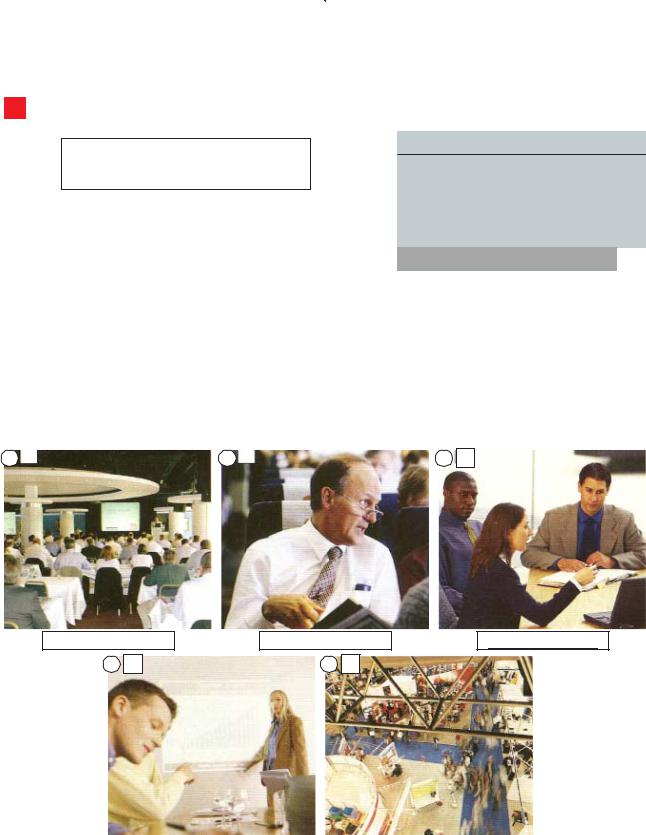
6 Action
|
Talking about life |
GRAMMAR |
Adverbs of frequency |
|
6.1 |
a lot (of) / lots (of) |
|||
at work |
VOCABULARY |
International business activities |
||
|
||||
|
|
|
|
1a Label the photos (a - e) with the words in the box.
go on business trips go to conferences have meetings give presentations
go to trade fairs
bDiscuss these questions with a partner.
Do you go to conferences?
Do you have a lot of meetings? Do you give presentations? Do you go on business trips? Do you go to trade fairs?
|
|
c |
64 |
Listen to five people talking |
||
|
|
|
about their jobs. Match the people you |
|||
|
|
|
hear to the photos. Write 1 - 5 in the |
|||
|
|
|
boxes. |
|||
a |
|
|
|
b |
|
|
|
|
|
|
|
||
|
|
|
|
|
|
|
d Vocabulary practice F Page 99, Exercise 1.
Adverbs of frequency
He often goes to the head office.
They’re always late for meetings.
always usually |
often sometimes not often never |
100 % |
0% |
F Grammar reference 17
c 1
_______________ |
_______________ |
have meetings |
d |
e |
|
_______________ |
|
_______________ |
36
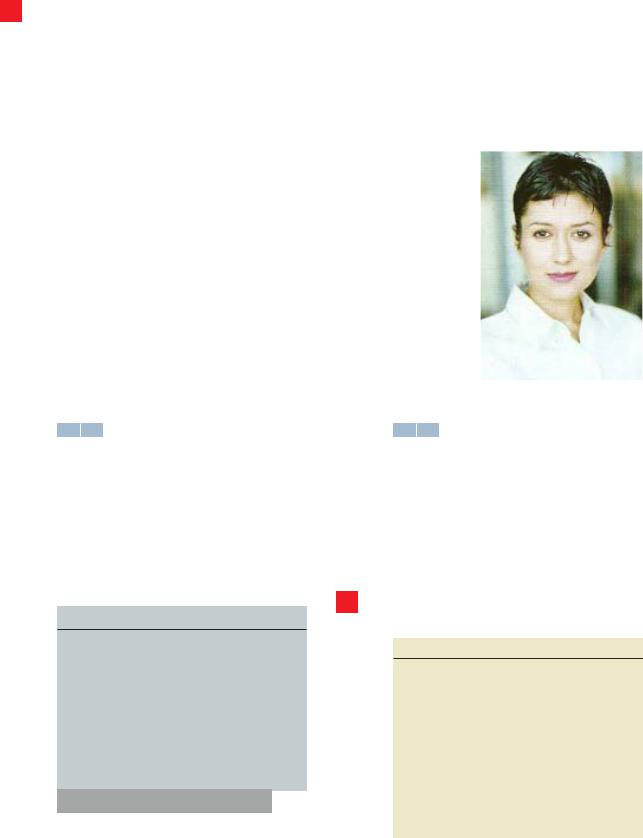
2a Look at the adverbs of frequency in the grammar box. Then complete the sentences so they are true for you.
1 |
I __________ give presentations. |
|
4 |
I __________ write emails in English. |
||
2 |
I __________ go on business trips. |
5 |
I __________ work at home. |
|||
3 |
I __________ work in the evening. |
|
|
|
||
b |
|
|
Listen to an interview with Veronica Stephens, a television producer.. How often |
|||
|
65 |
|||||
|
does she do these things? Tick ( ) the boxes. |
|
||||
|
|
|
|
always |
usually |
often sometimes never |
1works for TV companies in Japan.
2works with presenters in Japan.
3makes programmes in English.
4works with a team from Japan.
5works with a team from the UK.
6goes to Japan on business.
cWork with a partner. Make sentences about Veronica.
She usually works with television companies in Japan.
3 |
a |
66 Listen to Stuart Compton |
|
talking to a colleague about work. Are |
|
|
the sentences true (T) or false (F)? |
|
1 |
He doesn’t have a lot of meetings. T |
|
2 |
He travels a lot on business. |
|
3 |
He doesn’t make a lot of phone |
|
|
|
calls. |
4 |
He sends a lot of emails. |
|
b |
67 PRONUNCIATION Listen and |
repeat. How do you say of in these |
|
sentences? |
|
1 |
I have a lot of meetings. |
2 |
I don’t give a lot of presentations. |
3 |
Do you go to a lot of conferences? |
c Grammar practice F Page 99, Exercise 2.
a lot (of) / lots (of)
a lot of/lots of + noun
We have a lot of customers in France. We have lots of customers in Italy too. (a lot of/lots of = a large number)
verb + a lot
I go abroad a lot. (= often)
F Grammar reference 17
4Communication Practice 16 F Page 81. Work with a partner.
USEFUL LANGUAGE
Do you often travel on business?
I don’t often go abroad on business trips. I often send emails to foreign colleagues. I make a lot of international phone calls.
I sometimes go to trade fairs and conferences.
I never give presentations in English. I go to a lot of meetings in English.
37

6.2 |
Saying what you’re |
GRAMMAR |
Present Continuous |
|
doing at the moment |
VOCABULARY |
Time references to the present |
||
|
1 |
a |
68 |
Listen to the conversation |
|||
|
|
in the meeting. Fill in the gaps. |
||||
|
|
|
|
|
|
|
|
|
having |
phoning |
working |
moment |
|
|
|
now |
moment |
this |
today |
|
|
|
Jim |
Emma, I’m 1 |
having |
a |
|
|
|
|
meeting at the 2 ________ |
|||
|
|
|
with Laura and Chris. |
|
||
|
|
Emma Right. |
|
|
|
|
|
|
Jim |
You’re on the loud speaker. |
|||
|
|
Emma OK. Hi everyone. |
|
|||
|
|
Laura |
Hello Emma. |
|
|
|
|
|
Chris Are you having a good time in |
||||
|
|
|
Istanbul? |
|
|
|
|
|
Emma Oh, it’s great. Really good. |
||||
|
|
|
The only problem is, I’m 3 |
|||
|
|
|
________ . |
|
|
|
|
|
Chris I’m sure you aren’t working all |
||||
|
|
|
the time! |
|
|
|
|
|
Jim |
Emma, we’re 4 ________ |
|||
|
|
|
about your project. Can we |
|||
|
|
|
ask you one or two questions? |
|||
|
|
Emma |
Sure, go ahead. |
|
||
|
|
Jim |
OK. Chris? |
|
|
|
|
|
Chris |
Yeah. What’s your team doing |
|||
|
|
|
5 ________ , Emma? |
|
||
|
|
Emma |
Well, they aren’t working at |
|||
|
|
|
the 6 ________ . They’re |
|||
|
|
|
having lunch. |
|
|
|
|
|
Chris |
No, I mean on the project. |
|||
|
|
|
What are they working on 7 |
|||
|
|
|
________ week? |
|
||
|
|
Emma |
Oh, right. Um ... Well 8 |
|||
|
|
|
________ we’re working on |
|||
installation number six. We’re just finishing the testing on that - that’s the last job...
bVocabulary practice F Page 99, Exercise 3.
cWhat are Jim, Laura, Chris and Emma doing at the moment? Write the correct form of the verb. Refer to the conversation in 1a again, if necessary.
1 Jim, Laura and Chris are in the office this morning. a meeting (have)
2Emma isn’t in the office this week.
_______________ on a project in Istanbul. (work)
3Emma’s in Istanbul. _______________ a good time. (have)
4Emma’s at work at the moment.
_______________ a phone call. (make)
5Emma’s colleagues are having lunch.
_______________ at the moment.
6Laura’s in a meeting. She
_______________ lunch at the moment. (not work)
7Jim, Chris and Laura are talking.
_______________ Emma questions. (ask)
8Emma and her colleagues are on the last job. _______________ the testing. (finish)
38
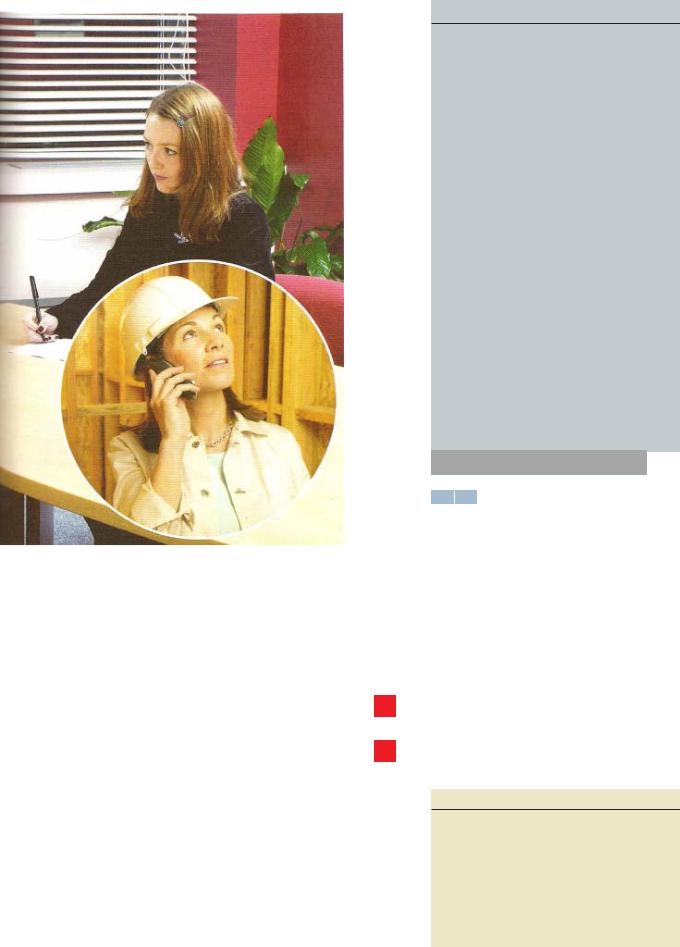
d |
|
69 |
PRONUNCIATION Listen and |
|
repeat the sentences. How do you say |
||
-ing? |
|||
1 |
I’m having a meeting. |
||
2 |
What’s she doing? |
||
3 |
She isn’t working today. |
||
4 |
We’re all working on the project. |
||
5 |
Are they having lunch now? |
||
6 |
What are you doing? |
||
e Grammar practice F Page 99, Exercise 4.
Present Continuous
Positive
I’m working on the report now.
She’s making a phone call.
They’re having lunch at the moment.
Negative
I’m not having a coffee at the moment.
He isn’t making a phone call.
OR
He’s not making a phone call.
We aren’t working today
OR
We’re not working today.
Both forms of the negative are in common use.
Questions
What’s she doing? (What’s = What is)
What are you doing?
Is he having a meeting?
Are they working on the project?
F Grammar reference 18
2 |
|
70 Listen to the conversations. |
|
|
What are the people doing? Complete |
||
|
the sentences. |
||
1 |
Steve’s |
having lunch |
|
______________________ . |
|||
2 |
Olivia’s |
______________________ . |
|
3 |
Colin’s |
______________________ . |
|
4Nadia’s ______________________ .
5Paolo’s ______________________ .
6Sylvia’s ______________________ .
3Communication practice 17. Student A F Page 81. Student B F Page 90.
4Talk to a partner. What are you working
on at the moment?
USEFUL LANGUAGE
He’s in a meeting this morning. They’re having a coffee at the moment. What are you doing now?
I’m not in the office today.
We’re working on the new project this week.
39
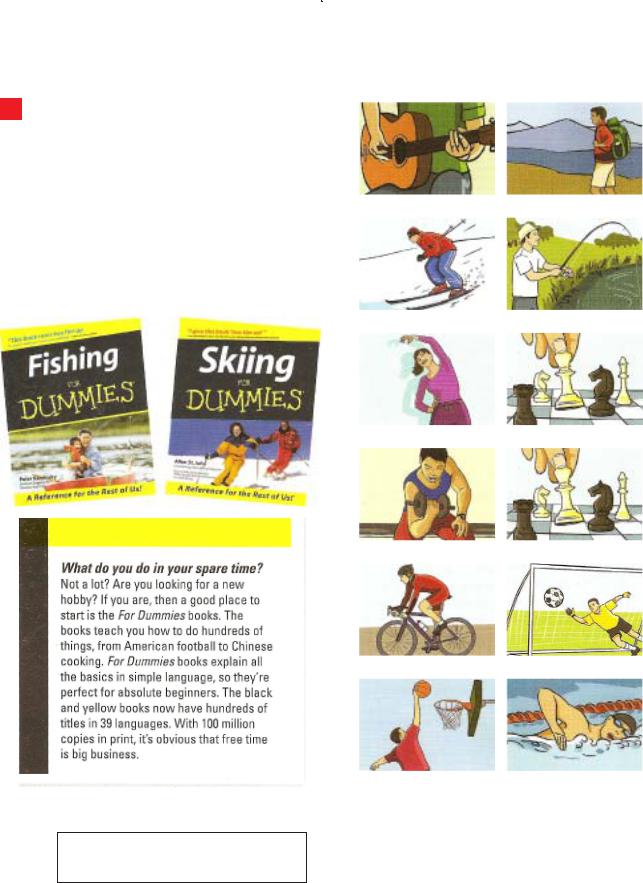
TIME
OUT
6.3 |
Saying what you do |
GRAMMAR |
Gerund |
|
in your free time |
VOCABULARY |
Sport and leisure activity |
||
|
1a Read the text. Can you buy For Dummies books in Brazil?
bAnswer the questions.
1 What is ‘spare time’?
2 Why do people buy For Dummies books?
3 What kind of people buy For Dummies books?
4 Is the For Dummies series successful?
1 ______________ |
2 ______________ |
3 ______________ |
4 ______________ |
5 ______________ |
6 ______________ |
7 ______________ |
8 ______________ |
9 ______________ |
10 ______________ |
11 ______________ |
12 ______________ |
cMatch the words to the activities in the pictures.
aerobics basketball chess cycling fishing football guitar running skiing swimming walking weight training
40
